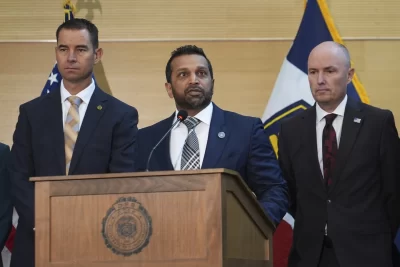
WASHINGTON — The Justice Department sued Ticketmaster and its parent company Thursday, accusing them of running an illegal monopoly over live events in America and asking a court to break up the system that squelches competition and drives up prices for fans.
Filed in federal court in Manhattan, the sweeping antitrust lawsuit was brought with 30 state and district attorneys general and seeks to dismantle the monopoly they say is squeezing out smaller promoters, hurting artists and drowning ticket buyers in fees. Ticketmaster and its owner, Live Nation Entertainment, have a long history of clashes with major artists and their fans, including Taylor Swift and Bruce Springsteen.
“It’s time for fans and artists to stop paying the price for Live Nation’s monopoly,” Attorney General Merrick Garland said. “It is time to restore competition and innovation in the entertainment industry. It is time to break up Live Nation-Ticketmaster.”
The government accused Live Nation of tactics — including threats and retaliation — that Garland said have allowed the entertainment giant to “suffocate the competition” by controlling virtually every aspect of the industry, from concert promotion to ticketing. The impact is seen in an “endless list of fees on fans,” the attorney general said.
“Live music should not be available only to those who can afford to pay the Ticketmaster tax,” said Assistant Attorney General Jonathan Kanter of the Justice Department’s Antitrust Division.
Ricky Palitti and Jacob DeLong of Detroit said they recently spent about $1,200 for three tickets to a Shania Twain concert using Ticketmaster and about $370 to see RuPaul’s Drag Race Live.
“I think tickets have definitely gone up in price, but I also think that all the different fees that Ticketmaster places on an order definitely hikes the price up, for sure,” Palitti said.
DeLong said that while he respects an artist’s work, the added fees make the costs to see a show “ridiculous.”
“Where can we get a break?” he said.
Live Nation, which has for years denied that it is violating antitrust laws, said the lawsuit “won’t solve the issues fans care about relating to ticket prices, service fees and access to in-demand shows.”
“Calling Ticketmaster a monopoly may be a PR win for the DOJ in the short term, but it will lose in court because it ignores the basic economics of live entertainment,” Live Nation added. It said most service fees go to venues and that outside competition has ”steadily eroded” Ticketmaster’s market share. The company said it would defend itself against the “baseless allegations.”
The Justice Department said Live Nation’s anti-competitive practices include using long-term contracts to keep venues from choosing rivals, blocking venues from using multiple ticket sellers and threatening venues that they could lose money if they don’t choose Ticketmaster.
In 2021, the concert giant threatened to financially retaliate against a firm if one of its portfolio companies didn’t stop competing with Live Nation for artist promotion contracts, the Justice Department alleged. Live Nation has also scooped up smaller promoters it viewed as a threats, officials said.
Michael Carrier, a professor at Rutgers Law School who specializes in antitrust litigation, said the Justice Department has a strong case. He expects Live Nation to “try to cast blame elsewhere,” such as arguing that prices are set by artists or venues, but he said those explanations are weak.
“The DOJ showed how Live Nation really has its tentacles in each element of the supply chain, which means that it has a lot more control than it is letting on,” he said. “And, in terms of justifications, there is really very little that (Live Nation) can offer in terms of how they’re helping the consumer.”
The complaint said a breakup between Live Nation and Ticketmaster is on the table. That, combined with other remedies such as preventing some exclusive deals that shackle competition, could potentially help fans see lower ticket prices, give artists more agency in choosing venues and boost smaller promoters’ success in the long run, Carrier said.
Ticketmaster, which merged with Live Nation in 2010, is the world’s largest ticket seller across live music, sports, theater and more. During its annual report last month, the company said Ticketmaster distributed more than 620 million tickets through its systems in 2023.
Around 70% of tickets for major concert venues in the U.S. are sold through Ticketmaster, according to data in a federal lawsuit filed by consumers in 2022. The company owns or controls more than 265 of North America’s concert venues and dozens of top amphitheaters, according to the Justice Department.
Live Nation’s footprint has grown substantially over the past 10 years, according to the company’s annual financial reports. Between the end of 2014 and the end of 2023, Live Nation reported a worldwide increase of more than 136% in terms of venues the company “owned, leased, operated, had exclusive booking rights for or had an equity interest over which we had a significant influence.”







